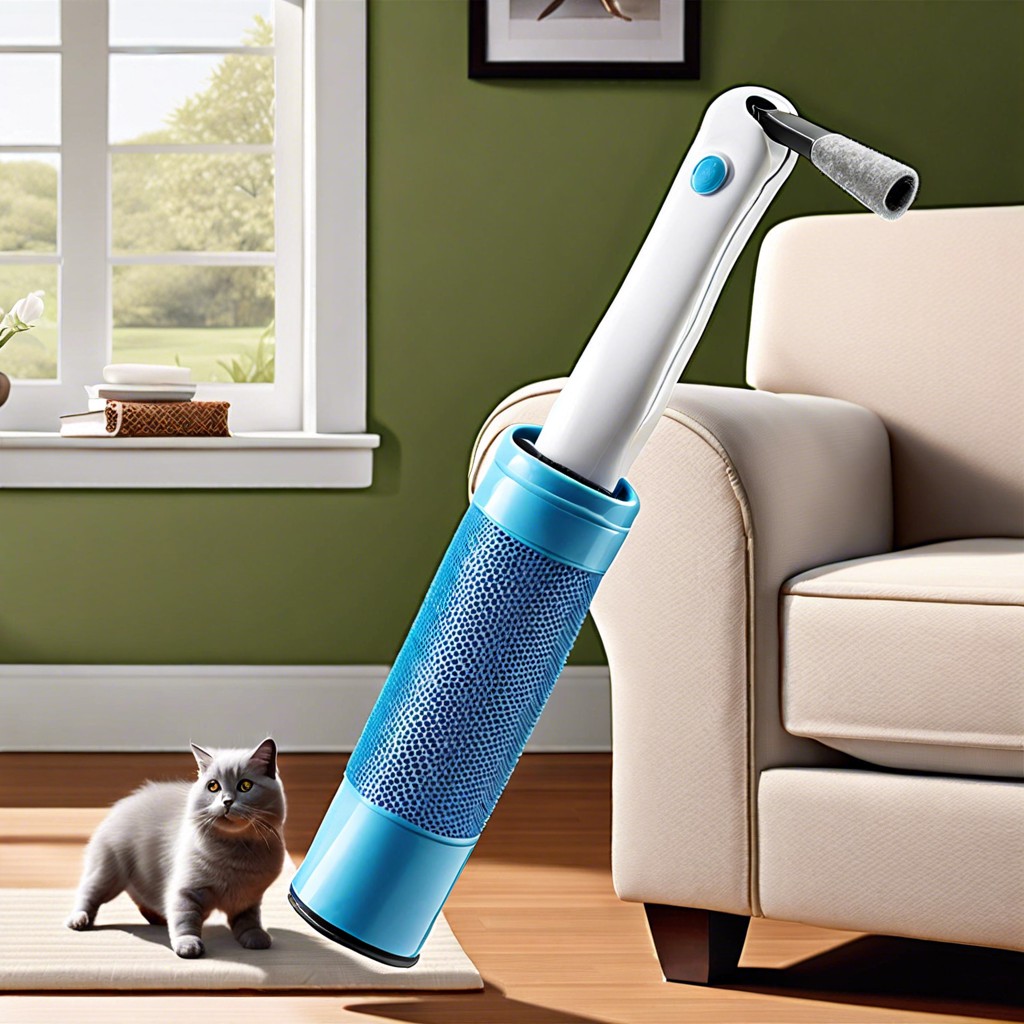Last updated on
This article provides practical, easy-to-follow steps on how to effectively eliminate body odor from your couch, restoring its fresh and inviting scent.
Key takeaways:
- Vacuum the couch to remove debris and dust that trap smells.
- Sprinkle baking soda over the couch and let it sit to absorb odors.
- Use a mixture of water and white vinegar to lightly mist the couch and lift odors.
- Launder removable couch covers with vinegar to remove odors.
- Consider using enzymatic cleaners for tough smells and maintain freshness with essential oils.
Table of Contents
Causes and Impacts of Body Odor On Couch Fabric
Sweat and skin oils are natural byproducts of our bodies that we often unknowingly transfer to upholstery. Over time, these organic materials get absorbed into the couch fabric, providing a breeding ground for bacteria which, in turn, leads to the unpleasant odor that can eventually emanate from your furniture.
Additionally, external factors such as spilled food, pet dander, and lack of ventilation can exacerbate this issue. These smells do not just cause discomfort but can also permeate other areas of your home, affecting the overall air quality. Fabrics such as cotton or polyester are particularly vulnerable as they easily trap these odors.
Recognizing these causes is the first step towards freshening up your couch and creating a more inviting living space.
Techniques for Cleaning and Deodorizing a Smelly Couch
Begin tackling the odor by giving the entire couch a thorough vacuuming. Reach into crevices and under cushions, removing any debris and dust that can trap smells.
Next, sprinkle a liberal amount of baking soda over the couch’s surfaces and cushions, allowing it to sit for at least 20 minutes or, ideally, overnight. Baking soda works wonders by absorbing odors without damaging fabric.
For deep-set smells, create an effective cleaning solution by mixing equal parts water and white vinegar in a spray bottle. Test on an inconspicuous area first to ensure colorfastness. Then, lightly mist the couch, taking care not to oversaturate it, as excess moisture can encourage mold growth. A gentle wipe with a microfiber cloth can help lift odors and stains.
If the couch covers are removable, launder according to the care label instructions. Add a cup of vinegar during the rinse cycle for an extra odor-fighting boost. Ensure couch covers are completely dry before replacing to avoid damp odors.
For tough and persistent smells, consider using an enzymatic cleaner which breaks down the odor-causing molecules. Always follow the instructions for the specific product you choose.
Lastly, maintain a fresh couch by placing a few drops of essential oils on dry baking soda, then sieve it over the couch, letting it sit, and vacuuming it up after several hours. This keeps your couch smelling pleasant without harsh chemicals.
Recommended Natural and Commercial Cleaning Products
Navigating the plethora of cleaning solutions can be overwhelming. Here are some effective options:
Natural cleaners offer a gentle yet powerful means to refresh your couch. Baking soda is a popular choice for its odor-absorbing qualities. Sprinkle it on the couch, let it sit for at least 15 minutes, and then vacuum thoroughly. White vinegar, though pungent at first, neutralizes stubborn smells once dried. Dilute it with water, spray lightly, and allow to air dry.
For commercial products, enzyme cleaners are particularly adept at breaking down the proteins in sweat, which contribute to body odor. Follow the instructions carefully, usually requiring application and a set period to act before removal. Additionally, specialized upholstery cleaners can tackle a range of fabric types; always check the label to ensure compatibility with your couch material.
To maintain freshness, consider sprays specifically formulated for fabric and upholstery. They can provide a quick fix for unexpected odors, but remember, these sprays mask rather than eliminate the underlying issue.
Consistent use of these products, in conjunction with proper cleaning techniques, will significantly reduce and prevent body odor in your couch’s fabric.
Importance of Regular Maintenance and Professional Cleaning Services for Stubborn Odors
Regular upkeep and occasional professional cleaning can significantly extend the life of your couch while keeping odors at bay. Here’s why it’s crucial:
- Preventative Approach: Frequent vacuuming removes sweat, skin cells, and oils that cause odors, acting as a preemptive strike against unpleasant smells.
- Deep Clean Advantage: Professionals are equipped with tools and techniques that go beyond surface cleaning, targeting odor-causing bacteria deep within the upholstery.
- Expert Assessment: A professional can evaluate whether the odor is due to general use or a specific issue like mold, which requires a specialized approach.
- Protecting Your Investment: Upholstery is prone to wear and tear. Professional services can help maintain fabric integrity, ensuring your couch remains plush, clean, and fresh.
- Efficiency and Effectiveness: DIY methods can be hit or miss. Professionals ensure the job is done right the first time, saving you time and potential frustration.
A well-maintained couch is more inviting and can contribute to a healthier living environment. Regular cleaning combined with professional services when necessary is the key to keeping your couch smelling fresh and extending its lifespan.
Common Mistakes to Avoid During the Cleaning Process
Using too much water on fabric can lead to mold growth and worsen odors. Always adhere to dry cleaning guidelines for certain upholstery types. Similarly, avoid harsh chemicals that may damage the couch material. Vigorous scrubbing, a common instinct when tackling stains, could fray fabric and embed odors deeper. A gentle approach ensures the material’s longevity while effectively addressing the smell.
Ensure thorough drying of the couch in a well-ventilated area; lingering moisture can cause new odors. Test any cleaning solution on an inconspicuous area before applying it to visible surfaces to avoid discoloration. Lastly, skipping a patch test with deodorizers may result in unwanted reactions with the couch material that could permanently damage the appearance or texture.
FAQ
How do you get body odor out of a couch?
To rid a couch of body odor, apply a layer of baking soda on it overnight, then vacuum the residue in the morning to neutralize the smell, yielding an odor-free settee.
Why does a room smell like body odor?
A room may smell like body odor due to the presence of bacteria breaking down sweat, particularly in areas of high sweat gland concentration like underarms and feet, exacerbated if the room lacks proper ventilation.
What are the most effective cleaning solutions to eliminate body odor from furniture?
Effective cleaning solutions to eliminate body odor from furniture include enzyme-based cleaners, baking soda, distilled white vinegar, and specialized upholstery cleaners.
How does body odor get absorbed into couch materials like fabric or leather?
Body odor is absorbed into couch materials like fabric and leather through a process called adsorption, where odor molecules adhere to the surfaces of the couch material’s fibers or pores.
Can deep cleaning techniques remove body odor embedded in couch cushions?
Yes, deep cleaning techniques can effectively remove body odor embedded in couch cushions.





